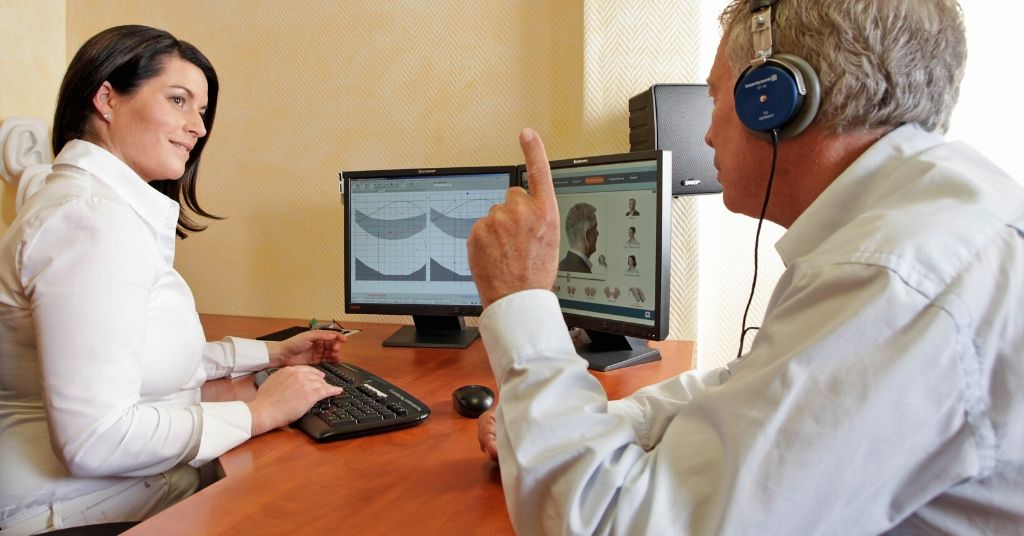
Finding childcare for my deaf child
May 12, 2016
World traveler, writer… and hearing aid wearer
May 16, 2016Why Worry: Hospital stays with hearing loss

Going into hospital for an operation can be scary at the best of times but, when hospital stays with hearing loss may come with many other concerns: Will I need to take my hearing aids off during procedures? How will I know what the doctors and nurses are saying to me? What about ototoxic drugs and the potential for an increase in hearing loss or tinnitus?
I recently needed to have a partial knee replacement. It involved a three-night hospital stay, an epidural anesthetic, major surgery and lots of physiotherapy. I knew I was going to encounter a lot of new people – some with deep voices, some with quiet voices, and the potential for me to experience communication difficulties seemed high. I was also worried about the possibility of the anesthetic causing an increase in my hearing loss.
Pre-Op
Before being admitted to hospital, I met with the surgeon and one of the physiotherapy team members. I explained to them about my hearing loss and they’d both taken steps to make sure they communicated clearly with me – looking at me when they spoke, and making sure I’d understood what they were saying. I also asked for a note to be added to my file to let all the staff know that I’m a lipreader and hearing aid user.
Before my operation, a friendly nurse came to settle me into my room and to explain what was going to happen. She double-checked my paperwork with me, speaking clearly and repeating things where necessary. She explained that I was fourth on the list and would be operated on around noon. I was asked if I had any questions or any concerns. I explained that because I’d read that epidurals could sometimes cause hearing loss, and there were cases of this happening after knee replacement surgery, I had some questions about the type of anesthetic that was going to be used and I wanted to know if I could opt for a general anesthetic instead. The nurse said the anesthetist would come and see me and I could discuss this with her.
The anesthetist seemed surprised by my question, as she had never had a patient suffer hearing loss following this type of anesthetic, but she listened to my concerns and clearly respected why someone with such a significant degree of hearing loss as me might be concerned about anything that might induce further loss. She explained that mild, hearing loss may occur after anesthesia, but it is usually transient and improved very quickly. She said that a general anesthetic had the same, minor risk of transient hearing loss as the local anesthetic. Given the other associated risks of a general anesthetic, she highly recommended that I proceed with the epidural injection, especially as the injection also included a strong painkiller. She said without the painkiller, the pain I would feel when the anesthetic wore off would be unbearable.
Convinced by the arguments and with my mind put at ease, I agreed to the local anesthetic. I asked if it would be OK for me to keep my hearing aids in during the procedure and I was told that would be fine. I wasn’t 100% sure I wanted to hear the sawing and drilling that would be taking place, but at the same time, I wanted to be able to respond to questions if necessary.
Operation
Being able to keep my hearing aids in on the “ride down to theater” was great because the banter of the nurses kept my mind occupied. The anesthetist gave me the shot and before I knew it, I was being wheeled into operating room. A sheet was erected so that I couldn’t see what was happening during the surgery, which was a relief ,as I hadn’t wanted to see in case I fainted with shock. Every now and then a nurse or the surgeon would ask if I was OK and then I started to drift off. The surgery lasted an hour, but to me it seemed to take only about 20 minutes.
After a while in recovery, I was taken in the lift back up to my room where I was soon enjoying a late lunch.
Post-Op (and a surprise wake-up)
With the help of a physiotherapist, I was up out of bed and walking with the aid of a walking frame by late afternoon. The goal was to be able to use walking sticks by the next day. I was given a couple of exercises to do and was told that in the morning we’d be tackling the stairs. Between exercises, I was to rest. Well, that was the plan!
At 4 a.m., I was awakened by the flashing of an intense strobe light in my room and the sound of a fire alarm so loud that even I could hear it without a hearing aid. Ordinarily, whenever we are alerted to a fire alarm, it’s second nature to assume it’s a false alarm or an opportunity for an evacuation practice, but as this alarm was sounding at 4 a.m. on a hospital ward full of people with severely limited mobility, I figured it was the real thing. This was something I hadn’t worried about before being admitted: “What if the hospital catches fire while I can’t walk?”
I managed to get myself to a sitting position and, despite the noise, I instinctively put in my hearing aids. I got to the edge of the bed and grabbed my walking frame. A nurse came in saying, “Hurry up. Hurry up. We need you get to the corridor.” Once there, I panicked, realizing that lifts were not used when there was a fire and that I had yet to be taught how to negotiate stairs with my new, bionic knee.
Thankfully, the nurses received new directions and decided to send each of us back to our rooms, insisting we close the door and stay put. I couldn’t manage to get back on the bed and the pain in my leg was excruciating. I had visions of having to be rescued via the window and hastily grabbed for my dressing gown and managed to lower myself onto a chair. There I sat for 20 minutes as the siren blared, my pain increasing and me with no idea what was happening. I started to worry about the possible impact such a loud, continuous noise might have on my hearing. I knew my hearing aids had a noise block facility, but even so, the noise was staggering. Then, suddenly, the siren stopped. It was a blessed relief.
It was quite some time before a nurse came and explained there was no actual fire. She administered some pain medications and helped me get back into bed. It took a while to get comfortable, and no sooner had a I drifted off to sleep than the physio came to see if I could negotiate stairs. I explained about the nocturnal exercises and was excused from the ‘stair challenge’ until lunchtime.
What, if anything, did I learn about hospital stays with hearing loss?
Well, I learned that you can worry that your hearing loss will mean you’ll miss the offer of a cup of coffee – or more vital information. You can worry about the effect of drugs on your hearing, and you can worry about 101 other things, but worrying will not change them one bit.
Chances are, something unplanned will happen. So, I resolved to worry less and try to just take things as they come.
Do you have any tips or experiences to share about hospital stays with hearing loss? I’d love to read them in the comments!




